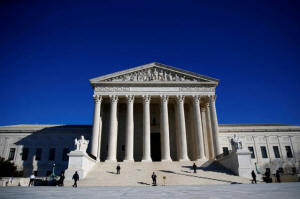|
U.S. top court mulls free speech fight
over 'crisis pregnancy centers'
 Send a link to a friend
Send a link to a friend
 [March 19, 2018]
By Andrew Chung [March 19, 2018]
By Andrew Chung
(Reuters) - The Pregnancy Care Clinic in
the Southern California city of El Cajon offers a host of services for
pregnant women including ultrasound exams, prenatal vitamins and
maternity clothes. There is one major exception: abortion.
Now the clinic, which staunchly opposes abortion, is among of a group of
Christian-based facilities, known as crisis pregnancy centers, involved
in a major case that goes before the U.S. Supreme Court on Tuesday.
They are challenging a California law that forces centers that are
licensed as family planning facilities to post notices that the state
has programs offering free or low-cost birth control and abortion
services, a requirement they argue violates their free speech rights
under the U.S. Constitution's First Amendment.
The law requires unlicensed facilities with no medical provider on staff
to disclose that fact.
"They're forcing us to use our walls as a billboard to promote
abortion," Pregnancy Care Clinic Executive Director Josh McClure said in
an interview.
McClure, whose facility is licensed, compared California's law to
forcing the American Lung Association to tell people where to buy
cigarettes.

California said in legal papers some of these centers try to prevent
women from accessing abortions by using incomplete or false medical
advice. Some try to resemble medical clinics down to lab coats worn by
staff, giving the impression they offer abortion services while
employing no actual medical professionals, California said.
The centers say they offer legitimate services and that their mission is
to persuade women to forego abortion.
The case is one of several the Supreme Court is tackling during its
current term in which conservative legal groups are invoking the First
Amendment and asserting that governments are unconstitutionally
compelling people to say or do things they oppose.
Similar cases this term involve plaintiffs who argue that the First
Amendment protects them from having to make a wedding cake for a gay
couple or pay fees to unions representing public employees to fund
collective bargaining.
These cases may have a sympathetic audience on a court with a 5-4
conservative majority that already has been receptive to First Amendment
arguments.
The Supreme Court is deciding six free speech cases this term. Three,
like this one, involve claims of unlawful "compelled speech." If the
court strengthens protections against compelled speech, that could
benefit conservative causes including limiting the reach of its 2015
decision legalizing gay marriage or freeing corporations from certain
regulations.
"A victory in each of these cases would signal that there are ...
situations where a free speech claim might prevail against the
government that might not have 20 years ago," said attorney Ken
Klukowski of the First Liberty Institute conservative legal group.

'VIOLATION OF CONSCIENCE'
Abortion rights advocates say the roughly 2,700 U.S. anti-abortion
pregnancy centers, including around 200 in California, far outnumber
facilities providing abortions.
[to top of second column]
|

Police officers stand in front of the U.S. Supreme Court in
Washington, DC, U.S., January 19, 2018. REUTERS/Eric Thayer/File
Photo

California's Reproductive FACT Act was passed by a Democratic-led
legislature in 2015 and signed by Democratic Governor Jerry Brown.
The San Francisco-based 9th U.S. Circuit Court of Appeals upheld it
in 2016, finding it did not discriminate based on viewpoint. The
pregnancy centers appealed that ruling to the Supreme Court.
Attorney Kristen Waggoner of the conservative legal group Alliance
Defending Freedom, which represents the centers, said the law
targets only these facilities. "Pointing the way to abortion is a
violation of conscience," Waggoner added.
Republican President Donald Trump's administration partially backed
the centers, opposing California's requirements toward licensed
facilities while not objecting to the requirements for unlicensed
centers.
The El Cajon facility serves about 800 clients annually and has
medical staff including doctors and nurses. It calls itself a "front
line ministry" supported by churches and other donors, and offers
Bible study for clients and opportunities for volunteers to spread
the gospel to visitors to the facility.
"Once they have accepted Christ," the clinic's website says, "we
begin a discipleship program with them and contact a partner church
to hand them off to."
Its website address, www.unplannedparenthood.org, resembles Planned
Parenthood, which provides healthcare services and abortions in
clinics around the country. McClure said his facility's name was
chosen because most clients have unplanned pregnancies.

Adrienne Kimmell, a vice president at the abortion rights group
NARAL, said the name was not coincidental, adding, "Almost all of
these places have names that are really confusing and they're
usually in the same city block as other centers that actually do
provide a full range of reproductive healthcare options."
McClure denied these facilities use deception. Regarding abortion,
McClure said, "We are very upfront that it is not a service we are
going to provide."
The American Medical Association told the justices McClure's
facility appears to be acting unethically because information it
provides on the debated link between abortion and breast cancer is
"likely to prove misleading."
Waggoner said the clinic's website is accurate and California has
presented no evidence of actual deception or confusion.
(Reporting by Andrew Chung; Editing by Will Dunham)
[© 2018 Thomson Reuters. All rights
reserved.]
Copyright 2018 Reuters. All rights reserved. This material may not be published,
broadcast, rewritten or redistributed.
Thompson Reuters is solely responsible for this content. |